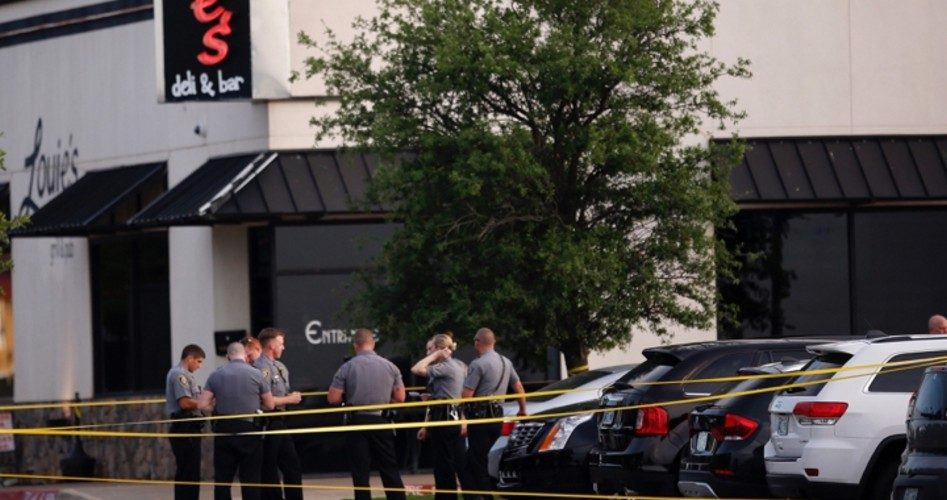
The National Rifle Association (NRA) called it “just another example of how the best way to stop a bad guy with a gun is a good guy with a gun.” The NRA was responding to the dramatic and heroic response of two separate men who stopped a shooter Thursday night at a northwest Oklahoma City restaurant on Lake Hefner.
Before the two men responded and killed the shooter, he had shot a mother and a daughter around 6:30 p.m. The two were reportedly celebrating a birthday, according to the woman’s father, Dennis Will. Will said they were celebrating the birthday of another one of his granddaughters. The two gunshot victims were identified as Natalie and Niah Will. A third victim sustained minor injuries, but the daughter underwent surgery. A fourth patron, attempting to escape the line of fire, fell and broke his hand. All are said to be in good condition. “I’m feeling good they’re both alive,” Will said.
Will expressed thanks to the passers-by who killed the shooter, possibly saving others from also getting shot. The shooter was identified Friday as Alexander Tilghman, a 28-year-old white male from Oklahoma City. “It doesn’t look like he knew anybody at the restaurant,” Captain Bo Mathews of the Oklahoma City police department told reporters. Although it is early in the investigation, the police have uncovered no evidence of mental illness. Mathews added that Tilghman apparently acted alone, and the motive remains a mystery.
But what is not a mystery is that two men, who apparently acted independently, used their own firearms to stop what could have been a shooting rampage. They were identified as Carlos Nazario and Bryan Wittle. It is unknown which man fired the shot that killed the shooter, but Captain Mathews praised both of them. “They were able to shoot this suspect and put an end to this very dangerous situation.”
When asked by CNN whether the two men faced any sort of legal problems, Mathews retorted that they were “well within their legal rights,” and will probably be protected by Oklahoma’s Good Samaritan Law, wherein the use of deadly force is allowed if acting in defense of oneself or others in a potentially life-threatening situation.
Ron Benton, who was inside the café eating when the gunfire erupted, gave his story to a local TV station. He said that, at first, he just thought it was typical restaurant noise, “a rack of plates crashing … glass breaking,” but then he heard “pop pop pop sounds, and a wall of people started making their way to the floor, and making their way around to the backside of the bar.”
Then the shooting stopped, and the gunman headed outside. Benton and some friends followed him out, and noted that the gunman “was wearing ear protection and eye protection that you have to have at a shooting range.”
Suddenly, Benton said, “A guy jumped out [of his car] and went for the back of his vehicle. I just assumed maybe it was an off-duty officer or something like that. It was just the way he moved, whoever it was. He just appeared to be somebody who had some training, some weapon training.”
Benton pointed toward the suspect, and the two men started shouting for the shooter to stop and put the gun down. They then exchanged gunfire, and the shooter was hit and killed.
While Benton thought it was an off-duty police officer, the fact of the matter is that he was not, but just a private citizen who, along with another private citizen, was able to stop a would-be killer because he was “good guy with a gun.” Certainly, a police officer would have been a welcome sight for patrons of the restaurant during such a terrifying experience. However, as is often said, when seconds count, the police are usually minutes away.
Had there not been two armed private citizens on the scene, the shoot-out in front of Louie’s would not have happened, and many other patrons might have been killed.
Ironically, Oklahoma Governor Mary Fallin vetoed a bill just two weeks ago that would have established “constitutional carry” recognizing the right of law-abiding citizens to carry a firearm without a costly permit. Fallin lamely explained that the bill would have eliminated “the current ability of Oklahoma law enforcement to distinguish between those carrying guns who have been trained and vetted, and those who have not.”
Of course, there were no law-enforcement officers present to “distinguish” anything, or to ask the heroic good guys with guns for their permits.
Photo: AP Images



